Hydrogen Powered Generators: The Future of Clean, Reliable Energy
Hydrogen powered generators are a big deal these days, and for good reason. They’re quickly becoming a major player in the clean energy world. People are talking about them as a real game-changer for how we get our power. These generators could help us move away from old, dirty energy sources and make our electricity supply more reliable. It’s all about making energy cleaner and more dependable, and hydrogen powered generators are right at the center of that conversation.
Key Takeaways
- Hydrogen powered generators use fuel cell tech to make electricity, putting out only water and heat.
- These generators are super useful for things like powering data centers, hospitals, and EV charging spots.
- Hydrogen can store extra renewable energy, which helps balance out power from things like solar and wind.
- Using hydrogen powered generators means less carbon pollution and a cleaner energy grid.
- Even with some challenges, like cost and storage, hydrogen energy is getting better all the time.
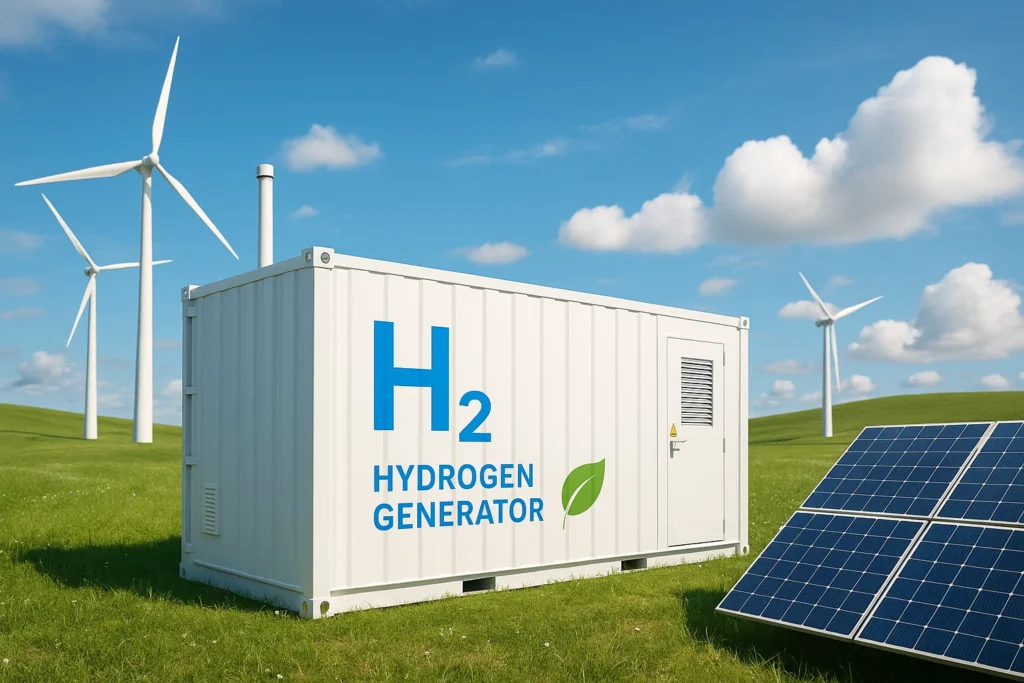
Understanding How a Hydrogen Powered Generator Works
So, you’re curious about how these hydrogen powered generators actually work? It’s not as complicated as it sounds, though there’s some cool science involved. Basically, instead of burning fossil fuels, these generators use hydrogen to create electricity. Let’s break it down.
Fuel Cell Technology in Hydrogen Generators
The heart of a hydrogen generator is the fuel cell. Fuel cells convert the chemical energy of hydrogen into electricity through a reaction with oxygen. It’s kind of like a battery, but it doesn’t run down. As long as you supply hydrogen, it keeps making power. The only byproducts are water and a little heat, which is why they’re considered so clean. The HPU functions as a self-charging battery system, utilizing green hydrogen.
Converting Green Hydrogen to Electricity
Okay, so how does this conversion actually happen? Inside the fuel cell, hydrogen molecules are split into protons and electrons. The protons pass through a membrane, while the electrons are forced to go around it, creating an electric current. This current is then used to power whatever you need – from a single vending machine to an entire data center. It’s a pretty neat process, and it’s way more efficient than burning fuel. Here’s a quick rundown:
- Hydrogen enters the fuel cell.
- It’s split into protons and electrons.
- Electrons create an electric current.
- Electricity powers your stuff, and water is the only byproduct.
Seamless Deployment and Operation
One of the best things about modern hydrogen generators is how easy they are to use. You don’t need a PhD in engineering to get one up and running. Most systems are designed for seamless deployment and operation. This means they can be installed quickly and easily, and they require minimal maintenance. Plus, many companies offer remote monitoring and support, so you don’t have to worry about things going wrong.
Hydrogen generators offer a reliable and clean alternative to traditional power sources. They are easy to integrate into existing systems and provide a consistent power supply with minimal environmental impact. This makes them a great choice for businesses and organizations looking to reduce their carbon footprint and improve their energy efficiency.
Hydrogen Powered Generator Applications Across Industries
Hydrogen powered generators are making waves across various sectors, offering a clean and reliable alternative to traditional power sources. From keeping the lights on in critical facilities to supporting the growing demand for electric vehicle charging, hydrogen generators are proving their versatility and potential.
Powering AI Data Centers and Tech Parks
AI data centers and tech parks require massive amounts of energy to operate. Hydrogen generators offer a solution that’s both powerful and environmentally friendly. These generators can provide a continuous, reliable power supply, reducing the carbon footprint of these energy-intensive facilities. Plus, the modular design of many hydrogen generators allows for easy scaling to meet the ever-increasing power demands of these industries. Think of it as a way to keep the servers humming without the guilt. The benefits of hydrogen are clear.
Reliable Energy for Hospitals and Schools
Hospitals and schools need a dependable power source to ensure the safety and well-being of their occupants. Power outages can have serious consequences in these settings, making backup power solutions essential. Hydrogen generators offer a clean and quiet alternative to diesel generators, providing a reliable source of electricity during emergencies. They also contribute to a healthier environment by reducing emissions and noise pollution. It’s about keeping the lights on and the air clean for those who need it most.
Supporting EV Charging Stations and Smart Cities
The rise of electric vehicles and smart cities is driving the demand for more charging infrastructure. Hydrogen generators can play a key role in supporting EV charging stations, especially in areas where grid capacity is limited. By generating electricity on-site, these generators can provide a clean and reliable power source for charging EVs, helping to accelerate the transition to electric mobility. They can also be integrated into smart city grids, providing a distributed source of power that enhances grid resilience and reduces reliance on centralized power plants.
Hydrogen generators are not just about providing power; they’re about creating a more sustainable and resilient energy future. By reducing emissions, enhancing energy security, and supporting the growth of clean technologies, hydrogen generators are helping to build a better world for generations to come.
Hydrogen as a Solution for Renewable Energy Storage

Renewable energy sources like solar and wind are great, but they’re not always available. The sun doesn’t shine at night, and the wind doesn’t always blow. This intermittency is a big problem for grid stability. That’s where hydrogen comes in. It can act like a giant battery, storing excess energy when renewables are abundant and releasing it when they’re not.
Addressing Intermittency of Renewable Sources
One of the biggest challenges with renewable energy is its inconsistent nature. Solar power is only available during the day, and wind power depends on, well, wind. Hydrogen offers a way to smooth out these fluctuations. By using excess renewable energy to produce hydrogen, we can create a buffer that ensures a more reliable power supply, regardless of weather conditions. This is especially important as we try to integrate more renewables into the grid.
Storing Excess Renewable Energy
When solar panels or wind turbines generate more electricity than needed, that surplus energy can be used to produce hydrogen through electrolysis. This hydrogen can then be stored for later use. Think of it as a way to capture and save energy that would otherwise go to waste. This stored hydrogen can be converted back into electricity when renewable energy production is low, providing a much-needed boost to the grid. There are some power-to-gas projects already in place that are doing just that.
Hydrogen as a Grid Stabilizer
Hydrogen can play a crucial role in stabilizing the power grid. By providing a flexible and dispatchable energy source, it can help balance supply and demand, preventing blackouts and ensuring a reliable power supply.
Hydrogen’s ability to work with renewable energy sources is key to its potential in the energy sector. By converting surplus renewable energy into hydrogen, energy that would otherwise go to waste can be captured and stored. This stored hydrogen can then be dispatched when renewable energy production is low, effectively smoothing out the variability of wind and solar power.
Here are some ways hydrogen can help stabilize the grid:
- Providing backup power during peak demand
- Balancing fluctuations in renewable energy supply
- Reducing the need for fossil fuel-based power plants
Decarbonizing the Grid with Hydrogen Powered Generators
Reducing Carbon Emissions in Power Generation
Hydrogen powered generators are a game-changer when it comes to reducing carbon emissions. Fossil fuels like coal and natural gas are the usual suspects for reliable power, but they dump a lot of carbon into the atmosphere. Hydrogen, especially when it’s made using renewable energy, can generate electricity with zero emissions. This means we can power our grids without contributing to climate change. It’s a big step towards cleaner energy.
Transitioning from Fossil Fuels to Hydrogen
Switching from fossil fuels to hydrogen isn’t just a pipe dream; it’s happening now. Countries are testing out how to integrate hydrogen into their power systems. The idea is to use hydrogen as a clean energy alternative to diesel generators for baseload power, which is the minimum amount of electricity needed to keep the grid running. This transition requires some work, like building new infrastructure and figuring out the best ways to store and transport hydrogen, but the payoff is worth it.
Hydrogen can act like a giant battery for the grid. When there’s too much renewable energy being produced, that extra energy can be used to make hydrogen. Then, when the sun isn’t shining or the wind isn’t blowing, that hydrogen can be turned back into electricity. It helps solve the problem of renewable energy being inconsistent.
Global Adoption of Hydrogen in Power Systems
Hydrogen isn’t just a local thing; it’s going global. Countries like Germany, Japan, and the United States are investing big in hydrogen as part of their plans to clean up their power sectors. There are pilot projects popping up all over the place, like power-to-gas projects in Europe. These projects show that hydrogen can be a how hydrogen fuel generators reduce carbon emissions and help us move towards a more sustainable energy future.
Advanced Features of Hydrogen Powered Generators
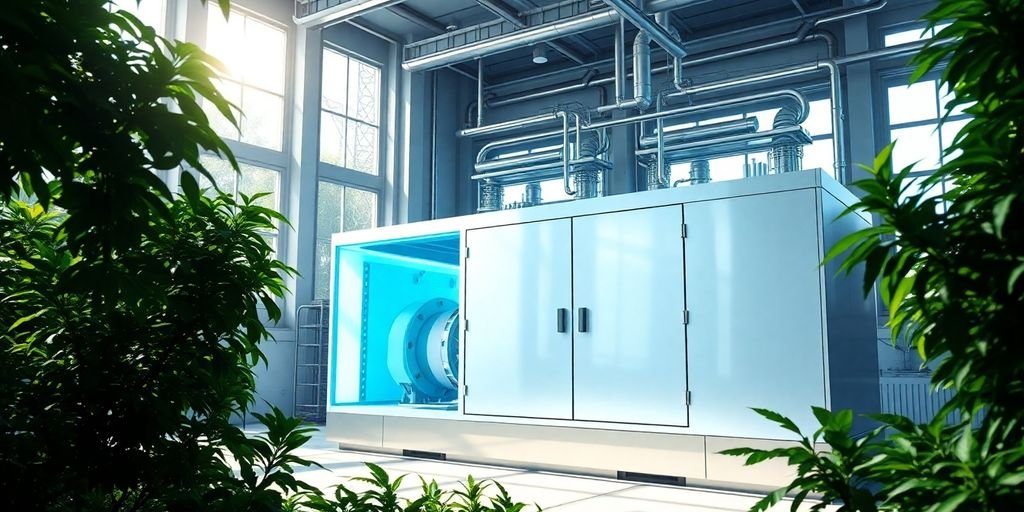
Hydrogen powered generators are making waves, and it’s not just about being green. They come packed with features that make them a serious contender in the energy market. Let’s look at what sets them apart.
High Energy Efficiency for Industrial Use
Hydrogen generators are optimized for industrial applications, providing a reliable and green energy supply without noise. This is a game-changer for industries that need consistent power without the environmental impact. The cost and efficiency of hydrogen powered generators are constantly improving, making them more attractive. They can adjust the number of operating units based on actual demand, reducing energy waste and enhancing operational efficiency. This makes them suitable for industrial parks, events, emergency power supply, and large-scale energy storage.
State-of-the-Art Safety Mechanisms
Safety is paramount, especially when dealing with hydrogen. These generators are designed with advanced safety mechanisms to ensure stable operations under demanding conditions. This includes:
- Multiple layers of leak detection.
- Automatic shutdown systems.
- Robust ventilation to prevent hydrogen buildup.
Hydrogen powered generators are built with safety as a top priority. They include features like automatic shutdown in case of leaks, and robust ventilation systems to prevent any build-up of hydrogen. This ensures they operate safely in a variety of environments.
Non-Toxic and Environmentally Friendly Operation
One of the biggest selling points is that hydrogen generators produce clean energy without harmful byproducts. They generate only water and heat, reinforcing a commitment to sustainability. This is a stark contrast to traditional generators that release pollutants into the atmosphere. The advantages of hydrogen powered backup generators are clear when it comes to environmental impact. They enhance energy efficiency while demonstrating a strong corporate commitment to green transition and environmental responsibility.
Here’s a quick comparison:
| Feature | Hydrogen Generator | Traditional Generator |
|---|---|---|
| Emissions | Zero | High |
| Noise Level | Low | High |
| Environmental Impact | Minimal | Significant |
| Energy Efficiency | High | Moderate |
Hydrogen Powered Generator Solutions for Specific Needs
Hydrogen powered generators are making waves, and it’s not just about general use. We’re seeing specialized solutions pop up to meet very specific needs across different industries. It’s pretty cool to see how this technology is adapting.
High-Power Generators for AI and Semiconductors
AI and semiconductor industries need a lot of power, and they need it reliably. Hydrogen generators in the 100 kW to 500 kW range are becoming a go-to solution. These generators offer:
- High energy efficiency, optimized for industrial applications.
- Advanced safety standards to ensure stable operations.
- Clean energy without harmful byproducts.
These high-power units are designed to provide a green and reliable energy supply, without the noise typically associated with traditional generators. They’re a great fit for companies looking to reduce their carbon footprint while maintaining peak performance. The GeoPura Hydrogen Power Unit (HPU) is a great example of this.
Next-Generation Solutions for EV Charging
As electric vehicles become more common, the demand for charging infrastructure is growing. Hydrogen generators are stepping up to provide zero-emission EV charging solutions. These systems offer:
- Scalable power options, adjustable between 1kW and 30kW.
- Flexible deployment, suitable for various scenarios.
- Plug-and-play operation for immediate power generation.
These generators can be deployed in highway service areas, urban charging hubs, and logistics centers, effectively reducing dependence on power grids. They promote sustainable, no-noise EV charging, which is a win for both the environment and the community.
Zero-Carbon Electricity for Vending Machines
Even something as simple as a vending machine can benefit from hydrogen power. Imagine a vending machine powered by a small, clean hydrogen generator. It’s a niche application, but it highlights the versatility of this technology. While I haven’t seen a specific product for this, it’s easy to imagine the [best hydrogen powered generator for home use] scaled down to fit this need. This could be a game-changer for outdoor events, parks, and other locations where grid access is limited or non-existent. It’s all about finding innovative ways to use hydrogen to power our everyday lives.

Overcoming Challenges in Hydrogen Energy Adoption
While hydrogen energy presents a promising path toward a cleaner and more sustainable future, several hurdles need to be addressed for its widespread adoption. It’s not all smooth sailing, and there are definitely some bumps in the road we need to navigate.
Managing Energy Prices for Hydrogen Production
One of the biggest challenges is the cost of producing hydrogen, especially green hydrogen, which is derived from renewable energy sources. The electricity needed for electrolysis, the process of splitting water into hydrogen and oxygen, significantly impacts the final price. Power Purchase Agreements (PPAs) can help stabilize electricity prices for hydrogen producers, but more innovation is needed to bring costs down further. We need to find ways to make hydrogen production more economically viable so it can compete with traditional energy sources.
Innovations in Hydrogen Storage Solutions
Storing hydrogen is another major challenge. Its low energy density means we need large storage facilities or advanced compression and liquefaction technologies to store it in smaller spaces. Plus, hydrogen’s small molecular size makes it prone to leakage, adding complexity to storage solutions. Here are some areas where innovation is crucial:
- Developing new materials for storage tanks that are less prone to leakage.
- Improving compression and liquefaction technologies to reduce energy consumption.
- Exploring alternative storage methods, such as solid-state storage.
Overcoming these storage challenges is essential for making hydrogen a practical energy carrier. We need to find ways to store it safely, efficiently, and cost-effectively.
Developing Efficient Hydrogen Transportation
Transporting hydrogen is also tricky. It requires specialized pipelines and infrastructure that can handle its flammable and volatile nature. Currently, hydrogen can be blended with natural gas in existing pipelines, but this isn’t a long-term solution because higher concentrations require purpose-built infrastructure. Here’s what we need to focus on:
- Building new, dedicated hydrogen pipelines.
- Developing efficient and safe methods for transporting hydrogen solutions by truck, rail, or ship.
- Exploring the possibility of converting hydrogen into other energy carriers, such as ammonia, for easier transport.
To summarize, here’s a quick look at the challenges:
| Challenge | Description |
|---|---|
| Energy Prices | High cost of producing green hydrogen. |
| Storage | Low energy density and leakage issues. |
| Transportation | Requires specialized pipelines and infrastructure. |
Conclusion
So, hydrogen power. It’s a pretty big deal for our energy future, right? It really helps with that whole “sometimes the sun doesn’t shine and the wind doesn’t blow” problem we have with renewable energy. Think of it like a big energy piggy bank, saving up extra power for when we need it. This also means we can finally start saying goodbye to those old, dirty power sources. Sure, there are still some hurdles, like making it cheaper and figuring out the best ways to store and move it around. But honestly, with all the new stuff happening, hydrogen generators are looking more and more like the real deal for clean, steady power.
Frequently Asked Questions
How do hydrogen generators actually make electricity?
Hydrogen-powered generators work like a clean energy factory. They use special tech called fuel cells to turn hydrogen gas into electricity. This process is super clean, only making water and a little bit of heat as leftovers. It’s like a magic trick that gives you power without the mess!
Are hydrogen-powered generators safe to use?
Yep, they’re super safe! These generators are built with really smart safety features to make sure everything runs smoothly. Plus, hydrogen itself is handled very carefully, so there’s no need to worry. They’re designed to be reliable and secure.
Where can hydrogen generators be used?
Absolutely! These generators are great for all sorts of places. Think big tech centers, hospitals, schools, and even places where you charge electric cars. They can also power vending machines and other things that need electricity far from the usual power lines. They’re very flexible!
How do these generators help the environment?
Hydrogen generators are a big help for the environment. They don’t put out any harmful stuff like carbon into the air. This means they help us fight climate change and make our planet cleaner. It’s a big step towards a greener future.
Is hydrogen energy expensive?
Right now, making hydrogen, especially the green kind (from clean energy), can cost a bit more. But many smart people are working on new ways to make it cheaper. Also, companies are making deals to keep the price of hydrogen steady, so it’s becoming more affordable.
Can hydrogen store energy from solar and wind?
Yes, hydrogen is amazing for storing extra power from things like solar panels and wind turbines. When there’s too much sun or wind, we can use that extra energy to make hydrogen. Then, when it’s cloudy or not windy, we can use that stored hydrogen to make electricity. It helps keep our power supply steady.

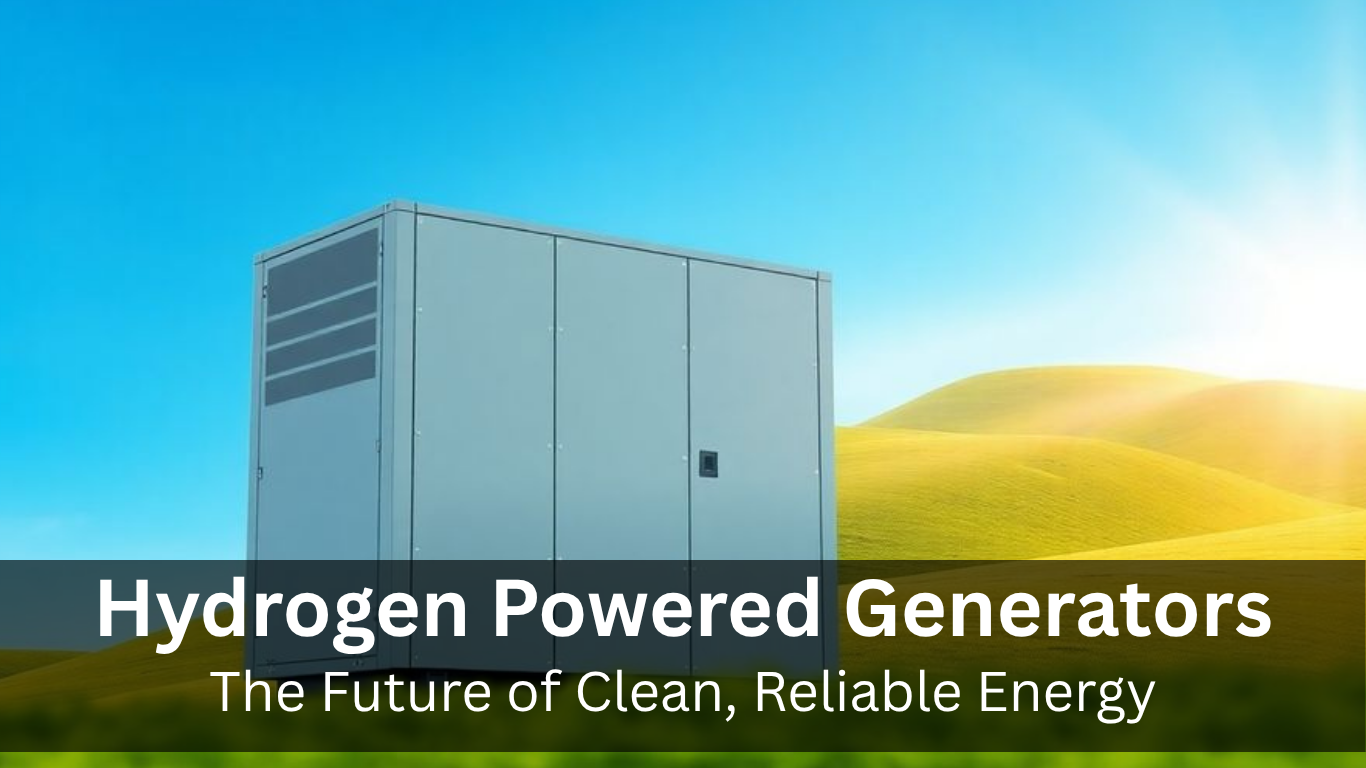
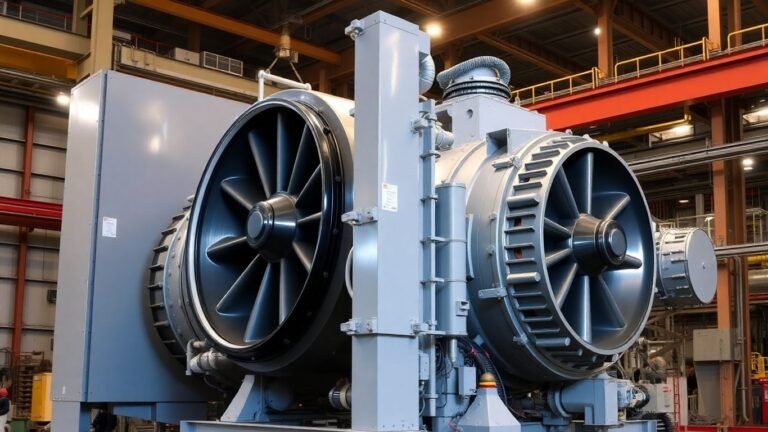


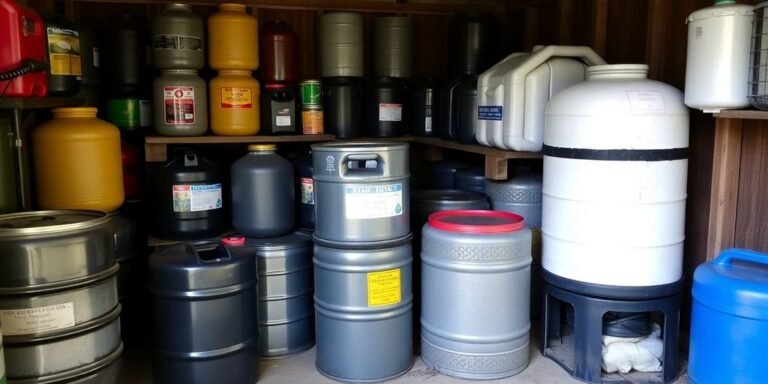


2 Comments